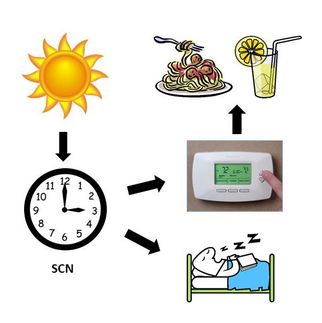Is it possible to reset our biological clocks?
Imagine being able to easily get over all of the discomfort and problems of jet lag or night-shift work. Science is not quite there, but recent work by Marc Cuesta, Nicolas Cermakian and Diane B. Boivin from the Douglas Mental Health University Institute and McGill University has opened new therapeutic avenues for improving the synchronization of the body's different biological clocks.
Physiological changes over the course of a day are regulated by a circadian system comprised of a central clock located deep within the centre of the brain and multiple clocks located in different parts of the body.
This study, which was published in The FASEB Journal, included 16 healthy volunteers who were studied in temporal isolation chambers. These results show, for the first time, that the peripheral biological clocks located in white blood cells can be synchronized through the administration of glucocorticoid tablets.
Significant disruptions
Since humans are fundamentally diurnal creatures, staying awake at night can significantly disrupt all of the body's internal biological clocks. These disruptions are far from harmless: over the long term, they can lead to a high incidence of various health problems, such as metabolic or cardiovascular problems or even certain types of cancer.
"Problems adjusting to atypical work schedules are a major issue for society. Our previous studies clearly show that desynchronized circadian clocks disrupt the sleep, performance and cardiac parameters of night-shift workers. However, current approaches to these problems have significant limitations, as a single therapy can't address the disruptions that occur in all biological clocks. For example, when used incorrectly, light therapy can even aggravate the situation," stated Dr. Diane B. Boivin, Director of the Centre for Study and Treatment of Circadian Rhythms, where the study took place.
Complex mechanisms
We still do not fully understand the mechanisms through which peripheral biological clocks adapt to night-shift work in humans, but it is thought that these clocks essentially depend on the central clock.
"Clock genes are what drive our biological clocks, and these genes are active in all of our organs. Animal studies have shown that our central clock (in the brain) sends signals to the clocks in our other organs. Glucocorticoids appear to play a central role in transmitting these signals. However, until now, no one had demonstrated that cortisol (a glucocorticoid) plays this role in humans," stated Dr. Nicolas Cermakian, Director of the Laboratory of Molecular Chronobiology.
"We studied the rhythmic expression of clock genes in white blood cells to see how they adjusted in response to glucocorticoids. These cells are involved in our body's reaction to attacks from many pathogens. This study therefore suggests that biological rhythms may play a role in controlling immune function in night-shift workers," added Dr. Marc Cuesta, a postdoctoral fellow who works in the laboratories of Dr. Boivin and Dr. Cermakian.
The previous work of Dr. Boivin and her team showed that exposing workers to bright light at night tor adjusting work schedules can improve the synchronisation of the central biological clock to their atypical work schedule. This new scientific discovery opens the door to innovative therapies that could act on the different parts of the circadian system so that these rhythms can be adjusted to inverted sleep schedules. These studies have possible applications for travellers, night-shift workers, patients suffering from sleep disorders and circadian rhythm disorders, as well as people with various psychiatric disorders.
"At this stage, we are not recommending the use of glucocorticoids to adjust the rhythms of night-shift workers, as there could be medical risks," explained Dr. Boivin. "However, these results lead us to believe that we may one day be able to use a combined therapy that targets the central clock (inverting work schedules, administering controlled light therapy) with a pharmacological treatment that targets the peripheral clocks to ensure that all clocks are adjusted."
Organizations
Other news from the department science

Get the life science industry in your inbox
By submitting this form you agree that LUMITOS AG will send you the newsletter(s) selected above by email. Your data will not be passed on to third parties. Your data will be stored and processed in accordance with our data protection regulations. LUMITOS may contact you by email for the purpose of advertising or market and opinion surveys. You can revoke your consent at any time without giving reasons to LUMITOS AG, Ernst-Augustin-Str. 2, 12489 Berlin, Germany or by e-mail at revoke@lumitos.com with effect for the future. In addition, each email contains a link to unsubscribe from the corresponding newsletter.


















































